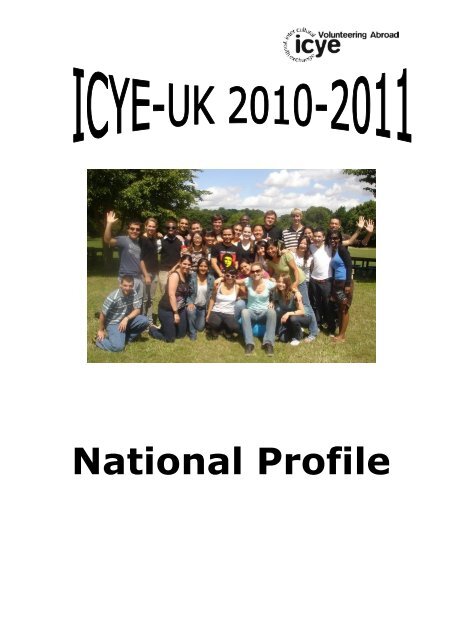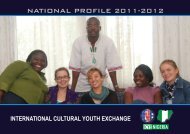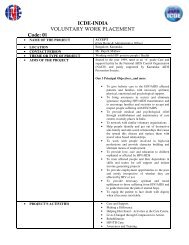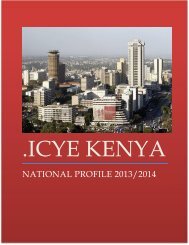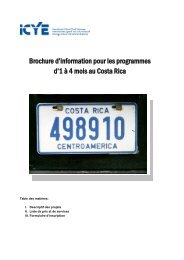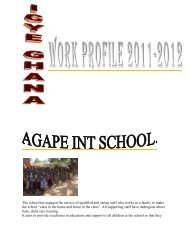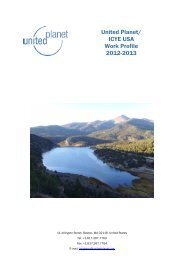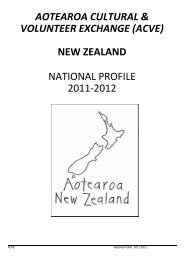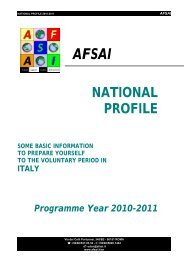National Profile - ICYE
National Profile - ICYE
National Profile - ICYE
You also want an ePaper? Increase the reach of your titles
YUMPU automatically turns print PDFs into web optimized ePapers that Google loves.
<strong>National</strong> <strong>Profile</strong>
Dear future exchangees!This booklet is intended to give you a few ideas of what toexpect from an exchange year in the UK with <strong>ICYE</strong>.Here you can find out more about <strong>ICYE</strong>-UK, the structure of theexchange year, the projects and living conditions here in theUK, and some practical information about UK life. There is alsoa contract for you to sign, and a checklist of things for you toremember to do before you leave.As well as reading this booklet you should also try to spendsome time finding out more about the UK – to help you do thiswe have included a list of useful books and websites, which youshould be able to access in your own country. You should alsospend as much time as possible practising your English!Please read the following information carefully – what is in this<strong>National</strong> <strong>Profile</strong> is essential information for you and should beconsidered carefully before deciding to join an <strong>ICYE</strong> Programmein the UK!!Please do not hesitate to contact us directly if you have anyquestions. Please e-mail us at hosting@icye.org.uk with anyquestions related to your stay in the UK.We look forward to meeting you!With best wishes,The <strong>ICYE</strong>-UK <strong>National</strong> CommitteeIMPORTANTE! Este '<strong>National</strong> <strong>Profile</strong>' contiene información muyimportante sobre el programa de <strong>ICYE</strong> en el Reino Unido. Porfavor, si hay algo que no entiendes, pide que alguien te lotraduzca!!!2
Contents1. Is <strong>ICYE</strong>-UK for me? Page 42. <strong>ICYE</strong>-UK Programme Page 52.1 The Camps Page 52.2 Other Activities Page 62.3 Host Page 62.4 Travel Month Page 63. <strong>ICYE</strong>-UK Projects Page 73.1 Types of projects available Page 73.2 Living arrangements Page 73.3 Locations of projects Page 84. Who can be an <strong>ICYE</strong> exchangee in the UK? Page 94.1 Language ability Page 94.2 Age Page 94.3 Certificate of good conduct (Police Certificate) Page 94.4 Enthusiasm & commitment Page 95. Practical Considerations: Page 105.1 Finances Page 105.2 Health Page 115.3 Checklist Page 115.4 Visa information Page 125.5 Useful books and websites Page 136. Code of Conduct Page 14/157. The Contract Page 168. <strong>ICYE</strong>-UK Structure Page 179. Some facts about the UK Page 199.1 A bit of history Page 199.2 The British temperament Page 199.3 Other information Page 203
1.Is <strong>ICYE</strong>-UK for me?Are you interested in….• Working with people with disabilities – either learning(mental) or physical?• Giving your time and energy to help others?• Improving your English while being fully immersed in UKculture?• Living in a UK community (NOT in a host family) often in thecountryside? Please note we have very few placements incities or big towns.• Experiencing a different culture and meeting other youngpeople from all over the world?• Taking part in <strong>ICYE</strong> training and activity camps with othervolunteers?Katri (CambridgeCyrenians) “I worked withhomeless people…Thebiggest problem for me atthe beginning wasunderstanding differentaccents. I worked withlots of Scottish and Irishpeople and it was reallyhard for me tounderstand them. Butafter some time I gotused to their accents and now I can evenunderstand drunk Irish and Scots!”Jasper (Living Options)“At first I found my volunteering difficult as Ihad never worked with people withdisabilities before. But I ended up having agreat year and my attitude towards peoplewith disabilities has really changed.”4
2. <strong>ICYE</strong>-UK ProgrammeThe <strong>ICYE</strong>-UK programme is made up of 3 main elements:• The full time voluntary placement• The camps• The travel monthAugust: Arrival and Language Camp (8 days) - compulsorySeptember – July: Voluntary Placement (full time - approximately 11 months) -compulsoryAutumn: Social Camp (1 weekend) - optionalFebruary: Mid-year camp (1 weekend) - compulsoryJuly: Final Evaluation (1 weekend) - compulsoryJuly-August: Travel Month – dependant on project / optional2.1 The CampsArrival and Language Camp:When you arrive in the UK you will go directly to Arrival and Language Camp, togetherwith the other exchangees from around the world. This camp lasts for 8 days. In themornings you will attend language classes and the afternoons will be spent preparing youfor your year here. We will have sessions on different subjects, such as UK lifestyle andculture, gender-roles and history. We will also prepare you for life at your placement.It is not only important that you learn about the UK, we also want to learn about you andyour country. Some evenings we will have international presentations – this is yourchance to tell the group about your country. Please bring photos, music and things fromyour country so that we can learn as much as possible about where you come from.Our main On-Arrival camp is in August, when the majority of exchangees arrive. If youarrive after this date or in January then your On-Arrival training will vary in length.After the camp, most of you will go straight to your placements. Occasionally you mayhave to wait before your project starts. While you wait we will arrange youraccommodation and a temporary short-term project.Mid Year Camp:This camp will be held one weekend in January or February. You will get together withthe other exchangees and with staff and volunteers from <strong>ICYE</strong>-UK to discuss anyproblems you might have encountered, and to spend some time reflecting on yourexperiences, preparing yourself for the second half of your year in the UK.Final Evaluation:This is another weekend camp. It will be the final time you meet as a group. This is achance to discuss and evaluate your year and experiences in the UK and to prepareyourself to go home to your own country.
2.2 Other Activities<strong>ICYE</strong>-UK tries to organise at least one other event each year, normally a camp in October/ November. As a group of exchangees you are also encouraged to organise your ownevents and activities.2.3 HOST-UK<strong>ICYE</strong>-UK has developed a partnership with the charity HOST-UK meaning that allexchangees coming to the country now have the opportunity to spend up to fourweekends each year staying with ‘host families’ across the UK. It provides each <strong>ICYE</strong>exchangee not only with the chance to experience living with a British family for aweekend, but also to visit other parts of the UK. <strong>ICYE</strong>-UK will pay the registration feeand exchangees must pay their own travel costs.2.4 The Travel MonthDepending on which project you are in the last month of your <strong>ICYE</strong>-UK year will be yourtravel month. During the travel month exchangees are totally independent. <strong>ICYE</strong>-UK isable to give support and advice, but during this month <strong>ICYE</strong>-UK is no longer responsiblefor providing accommodation or food. Please see 5.1: Finances for information aboutpocket money during your travel month. <strong>ICYE</strong> gives each volunteer £40 at the start oftheir travel month – this money is to cover your travel to the airport on your returnhome. Exchangees who do not wish to spend a month travelling should arrange theirown alternative activities or make arrangements to return home early.6
3. <strong>ICYE</strong>-UK Projects3.1 Types of projects available in the UKMost of the projects in the UK involve some sort of social/care work. Our projects includeworking in schools for children or young people with learning difficulties or disabilities,helping in hostels for homeless people, or caring for a person with a disability in his/herown home. All these projects involve working directly with people in need. We may alsobe able to offer a limited number of places on other types of projects, for exampleactivity centre projects. Please refer to our separate Work <strong>Profile</strong> for more detailedinformation on the specific projects we offer.IMPORTANT!All of <strong>ICYE</strong>-UK’s projects rely on volunteers. You are not “just a visitor” and whilst thework you will do will bring added value to the project, it is important to remember youare like a member of staff. You have important responsibilities and can only take timeoff when the project agrees to you doing so. This can sometimes be very difficult as itlimits the amount of freedom you have.<strong>ICYE</strong>-UK tries to send you information on which project you will be working at before youarrive in the UK. However some projects want to interview the volunteers themselves,while others will accept volunteers by looking at volunteer applications only. It isimportant that we have an accurate idea of your level of English in order for us to placeyou in a suitable project.What type of work will I be doing?As a full-time volunteer you are expected to participate as any other member of staff.Each project requires volunteers to do certain tasks. This may be anything from cookingand housekeeping, helping in IT rooms, to organising a day out in the countryside, orhelping people with their personal care.When will I work?Volunteers usually work between 35 and 40 hours each week. Sometimes there will be ashift or rota system where some work during night or weekend work may be required.Volunteers are entitled to two days off each week. You will also be given an Annual LeaveHoliday allowance, which should equal approximately one week of holiday for every fourmonths of work, however projects may vary slightly.What if I do not like my project?<strong>ICYE</strong>-UK does expect you to stay at the same project for the whole year. In only seriouscases, where mediation from <strong>ICYE</strong> and consultation with the project has taken place andthe problem cannot be solved, it may be necessary to change project. Exchangees areonly entitled to change projects once during the year. Exchangees may not changeprojects in the first three months of their placement.7
How expensive is the UK?There is no escaping it – the UK is expensive! Prices are normally a lot higher in Londonthan in smaller towns, thus the great difference in price for the same product. To giveyou an idea of what you may spend, here are some average prices. Prices may also varygreatly from shop to shop, so it is worth looking around!Drinks in a pub or bar Beer (pint) 3.00, (half pint) 1.50Wine (glass) 2.90, Soft Drinks 1.00Coffee 1.20, Tea 0.70Petrol0.97 per litreShampoo (200ml) 1.50Toothpaste (100ml) 1.50Kit Kat 0.45Can of Pepsi 0.80Meal in a restaurant From 8.00Meal in a café 4.00McDonalds Meal 3.50Fish and Chips 5.00Theatre ticket 25.00Cinema ticket (Adult)10.00 (in London)/ 7.00 (outsideLondon)Milk (2 pints) 0.80Apple Juice (1 litre) 0.70Bread (400g loaf) 1.106 Eggs 1.08Sugar (750g) 0.79Butter Spread (250g) 0.75Raspberry Jam (454g) 0.58Newspapers 1.20Bank AccountIn most cases, your pocket money will either be paid to you by cheque or will go straightinto your bank account. Some projects however pay you your pocket money in cash.Opening a bank account can therefore be one of the first things you should try and dowhen you arrive at your project. Unfortunately it has become increasingly difficult toopen bank accounts in the UK, especially in large cities. The bank will normally ask youto provide statements and references from your bank in your home country and areference from your project in the UK.You may be able to open an account with a UK bank BEFORE coming to the UK. This willavoid delays in you being able to access your money. The largest international banks inthe UK are HSBC, Lloyds, Barclays and Citibank.If, once you are at your project you are unable to open a bank account with the help ofyour project, then we recommend that you contact <strong>ICYE</strong> UK. We may be able to supportyou further to open an account.5.2 HealthAs an <strong>ICYE</strong> exchangee you will be fully covered by a comprehensive health insuranceshould you experience any health problems or accidents during your stay. On arrival atyour project you should register with a local doctor (also known as a GP – General11
Practitioner) to whom you can go, should you have any health problems. Registeringwith a GP is completely free in the UK as part of the <strong>National</strong> Health Service. If you areprescribed any medicine you may have to pay for the prescription yourself (£6.50) – thismay be refundable from your Health Insurance so make sure you keep all receipts. It isbest to register when you first arrive to avoid any delays if you need to see a doctorurgently in the future.5.3 Checklist–what you need to do before you leave yourcountryPlease ensure that you have:A valid passportAppropriate Entry Clearance / Visa (contact your local British Consulate orEmbassy if you have any queries)A police certificate - this is a certificate issued by the police confirming that you donot have a criminal record. (Please see point 4.3 – Suitability of Character)Proof of home address (for example a bill/bank statement)An Original birth certificate – this is necessary for your CRB check once you are inthe UK.Driving Licence (if you have one)Sent two written references to <strong>ICYE</strong>-UKCorrectly issued flight ticket and that your flights are confirmedA sleeping bag – this is essential, as you will need it for your on-arrival campWarm clothes and good shoesAll your <strong>ICYE</strong> papers - including this <strong>National</strong> <strong>Profile</strong>Small gifts from your country to give to people in your project / friendsMusic and games from your country for the campsSome information about your own country: pictures, brochures, maps, books,coins, recipes, etc.Do not bring too many things with you to the UK – YOUwill have to be able to carry your own luggageeverywhere!When you arrive at the airport you will have to carry your own luggage to the camp:this means up and down stairs and for long distances between the station and the campitself. Afterwards you travel on your own or with other volunteers by train to your projectand again you will need to carry your own luggage.Exchangees often arrive with a year’s supply of toiletries – these are heavy and can bebought very cheaply in the UK. Just bring what you need for the camp and buy morewhen you get to your project. Warm winter clothes can be bought cheaply in secondhandshops all over the UK.Backpacks are easier to carry and more convenient to store than suitcases. If you bring asuitcase make sure that you can carry it comfortably. One piece of advice is to packyour bag and then take out half of the stuff – you’ll still have more than you need!12
5.4 Visa information-Volunteers from non-EU/EEA countriesThe general rule is that non-EU / EEA nationals need a visa to volunteer in the UK. As avolunteer on the <strong>ICYE</strong> programme, <strong>ICYE</strong>-UK will officially sponsor your visa applicationunder the ‘Tier 5 (Temporary Worker): Charity Worker’ category. Important elements ofthis type of visa include:• Individuals can volunteer in the UK with a registered charity• Volunteer work must reflect the aims of the charity• Individuals can stay and volunteer in the UK for a maximum of 12 months.• Volunteers are allowed to receive pocket money, board and accommodation, butno additional remuneration• Volunteers must not seek or take any paid employment whilst they are here (noteven casual).• Volunteers can not leave the programme and stay in the UKTravelling with a visaDepending on your nationality, you will need to apply for a visa (the technical term forthis is ‘Entry Clearance’) in your home country before departure.When you apply for your Entry Clearance you will be asked to submit confirmation from<strong>ICYE</strong>-UK that you will take part in our programme. As soon as we receive yourapplication form and have found you a project, we will send you an invitation letter, aCertificate of Sponsorship and any additional documents that you need to apply for yourvisa. It is important that you prepare your application carefully. Once you know whichproject you will be working with please find out as much as you can about the projectand ask us if you feel you have not got enough information. Please also think about howdoing voluntary work for a year fits in with your background, future plans, etc. They wantto be assured that you will be returning to your home country after a year and that youare not using <strong>ICYE</strong> as a way to gain entry to the UK so it is important to be clear aboutwhat your future plans in your home country will be.If you have any problems getting the visa, please contact us immediately.Volunteers form certain countries also need to register with the police when they arrivein the country. This incurs a fee of £35, which YOU will have to pay. <strong>ICYE</strong>-UK can adviseif you are not sure if this applies to you.Volunteers from EEA countriesCitizens of the European Economic Area do not need an Entry Clearance to the UK andwill not need to give the immigration officer any information about their stay in the UK.In most cases the immigration officer will just look at your passport and there is no needto register anywhere once you are in the UK. Please note that the list of countries whose citizens require a visa beforearriving in the UK is subject to change, so please contact your nearestConsulate for the latest update. Information and application proceduredetails also available on www.ukvisas.gov.uk13
5.5 Useful books & websites• Lonely Planet Guide to the UK & Ireland• www.ukvisas.gov.uk (for advice on visas etc)• www.britainexpress.com• www.great-british-pages.co.uk• www.guidemeto.co.uk• www.counties.co.uk/counties/contact• www.london-pages.co.uk• www.soon.org.uk/britain• www.thisislondon.co.uk14
6. Code of Conduct for VolunteersSafety• You must not act in any way that could put others or him/herself at the risk of beinginjured• You understand that being under the influence of alcohol may interfere with ourability to deliver service. You also understand that the influence of alcohol can remainin the body for many hours after consumption. You therefore agree not to performyour volunteer duties while under the influence of alcohol and not consume alcoholwith a client of your host project• You will respect and use all equipment in the way in which it was intended. Inparticular, you will always make use of any safety equipment provided.• You will follow all procedures to the best of our ability at all times• You will promote healthy and safe work practices by ensuring that co-workers adhereto a similar approach and taking appropriate steps in relation to those who do not.Legal• You are expected to respect the organisational policy of the host organisation. Thisincludes the health and safety regulations as well as any regulations outliningrelationship boundaries• You must respect and comply with UK law• You must not take illegal drugs and understand doing so may result in your removalfrom the <strong>ICYE</strong> programme or arrestRespect and Integrity• You should seek to promote integrity by being honest, fair, and respectful of others• You must always respect the fundamental rights, dignity, and worth of all people,including the rights of individuals to privacy, confidentiality, self-determination, andculture• You are responsible for maintaining the confidentiality of all proprietary or privilegedinformation to which you are exposed to while serving as a volunteer. Suchinformation includes but is not limited to: information regarding a staff person,volunteer, member, or third party• You should use <strong>ICYE</strong> and your host projects resources in an appropriate manner• You must take good care of the accommodation that has been provided for your use• You must keep <strong>ICYE</strong> UK and your host project informed about your whereaboutsduring the exchange period, including notifying them of any travel plansCommitment to host organisation and <strong>ICYE</strong> programme• You have a responsibility towards the host organisation and should show willingnessto adapt to their surroundings and to carry out agreed tasks. While there you will beinvolved in interesting activities however some of the tasks could be routine butimportant to the running of the organisation. You should be willing to complete thesewhere necessary.• You should strive to maintain high standards of competence in your work. You should15
also recognise the boundaries of your particular competencies and the limitations ofyour expertise.• You must attend all the activities foreseen by the programme and the eventsorganised <strong>ICYE</strong> UK (on-arrival, mid-term meeting, final evaluation)• You have the responsibility to remain in the project for the agreed duration unlessthere is a good reason to leave the project. You should discuss such reasons withyour host organisation and your host national committee before leaving your project.<strong>ICYE</strong> UK will not be responsible for your living costs if you do choose to leave theproject without talking with <strong>ICYE</strong> UK first.• If you decide to leave the <strong>ICYE</strong> programme, you must notify the <strong>ICYE</strong> UK and yoursending organisation of your intention to withdraw from the exchange programmeand sign the contract of dissolution if relevant.Complaints• You should use the grievance and complaint procedure as outlined in the terms andconditions.• You have the responsibility to seek guidance when necessary. If you have a problemyou should discuss it with <strong>ICYE</strong> UK as the organisation can only act when it is awareof a problem.Representing <strong>ICYE</strong>• Prior to any action or statement that may significantly affect or obligate <strong>ICYE</strong>,volunteers should seek prior consultation and approval from appropriate staff. Theseactions may include, but are not limited to, public statements to the press, coalitionor lobbying efforts with other organizations, or any agreements involving contracts,resources, finances, or other obligations.Non complianceYou understand that failure to adhere to any and all parts of this code may result insuspension or cancellation from the <strong>ICYE</strong> exchange programme.Signed:Date:16
7. Contract for exchangees1. I have read and understood <strong>ICYE</strong>-UK's <strong>National</strong> <strong>Profile</strong>, the Project <strong>Profile</strong> and theCode of Conduct and accept its content. I have paid special attention to the parts onthe project requirements and the pocket money.2. I understand that I will not live in a host-family during my year in the UK.3. I will be flexible regarding the type of placement and will not ask to change projectmore than once during my exchange year. I will not refuse to go to or remain at aproject due to its geographical location.4. I will live in any place in the UK, whether it is in the countryside or in a city.5. I understand why the projects in the UK need responsible volunteers who have acertain level of English and confirm that I am able to communicate in English.6. I understand that I will receive my pocket money directly from the project and willnot ask <strong>ICYE</strong> to pay additional money.7. I shall not seek or accept paid employment during my exchange year and understandthe consequences if I do.8. I will attend the compulsory camps (language camp, mid-year camp and finalevaluation camp) as planned and organised by <strong>ICYE</strong>-UK.9. I understand that I can only travel for four weeks at the end of the exchange yearand cannot leave for my travel month until after the final evaluation camp. Traveloutside of the travel month can only take place after consultation with the project andwith <strong>ICYE</strong>-UK.10. I accept that <strong>ICYE</strong>-UK is not responsible for providing me with food andaccommodation during my travel month.11. I will return to my country after my exchange year. If I fail to do so, I understandthat <strong>ICYE</strong>-UK can inform the authorities about my whereabouts.12. I will respect and comply with UK lawI have read and understood the above contract and agree to adhere to its content.Name:Country:Signature:Date:____________________________________________________________________________________________________________________________________________________Please send this contract to the <strong>ICYE</strong>-UK office togetherwith your application form.17
8. <strong>ICYE</strong>-UK STRUCTURE<strong>ICYE</strong>-UK was founded in February 1993 and in July 1994 a small group of exchangeesarrived in the UK. Since then the organisation has grown steadily and we are planning toreceive 40 exchangees in August 2008. This year we have 40 exchangees from 18different nationalities.<strong>ICYE</strong>-UK’s office is on the top floor of Latin American House in North West London. Theoffice is run by three full-time and one part-time member of staff. There is also a team ofvolunteers and co-workers who help with camps and events, and who help with runningthe organisation. The Management Committee is also made up of young people, most ofwhom are returned exchangees – each person has responsibility for a specific area of<strong>ICYE</strong>-UK’s work.Who will I meet from <strong>ICYE</strong>-UK?STAFF:Pascale Hall: Hosting Programme Co-ordinatorPascale works in the office five days a week. She is responsible for the well being of theexchangees from overseas (including EVS volunteers) – this includes finding andsupporting projects, running camps and supporting the volunteers.Pascale will be your first point of contact at <strong>ICYE</strong>-UK throughout your year in the UK.Jenny Williams: Long Term Sending Programme Co-ordinatorJenny works in the office five days a week. She is in charge of finding British volunteerswho want to go abroad for long-term <strong>ICYE</strong> and EVS projects, publicity and marketing andlots of other random jobs!Cat Udal: Programmes Co-ordinatorCat works in the office five days a week. She is involved in information distribution andadministration. She is also responsible for developing new <strong>ICYE</strong> and EVS projects andalso supports and develops all the <strong>ICYE</strong> programmes. She is also a key member of theteam at <strong>ICYE</strong> camps, and always there to offer support.Charlotte Dando and Sarahgwen Sheldon: Short Term Co-ordinatorsCharlotte and Sarahgwen both work in the office part time. They are responsible forfinding British volunteers who want to go abroad on short-term overseas projects.MANAGEMENT COMMITTEE:Chair: Adam HaighAdam was an <strong>ICYE</strong> Exchangee in Honduras in 2004/5 and has been actively involvedsince his return. Adam joined the management committee in 2006 and was elected asChair in October 2009.18
Secretary: Nick TaylorNick was an exchangee to Russia in 2002/03 and has been involved with the running ofthe organisation ever since. He recently gained a PhD and now works in engineering. Aswell as his role as Secretary, Nick is our star attendee at <strong>ICYE</strong> camps!Treasurer: Mina RaiMina was a volunteer in Honduras in 2004/05 and has been involved developingMembership and the Befriending Scheme for <strong>ICYE</strong>-UK. Mina became the treasurer in2009 and now oversees all the finances and accounts! Mina works for a women’s rightsorganisation.Member: Samad NadimiSamad was a volunteer in India in 2004/05 and has recently joined the ManagementCommittee. He has previously been actively involved in the Membership Group and hasclose contact with our incoming volunteers. Samad is a youth worker in London.Member: Sophie Bray-WatkinsAlso a new member of the Management Committee, Sophie has just finished avolunteering placement in the Dominican Republic and was previously Sending Coordinatorfor <strong>ICYE</strong>-UK. She now works for a youth charity in London.Member: Jonathan DandoJonathan was an <strong>ICYE</strong> Exchangee in Uganda in 2007-08. Since coming back to the UK hehas been actively involved in the Membership Group and joined the ManagementCommittee in October 2009. For his day job he works for a <strong>National</strong> Youth Charity and ismarried to one of our short-term programme coordinators.Member: Paddy CrawleyPaddy was a volunteer in India with <strong>ICYE</strong> in 2006-07 and has been involved in theorganisation ever since through helping with camps and fundraising activities. When notinvolved in the work of the Management Committee, Paddy is a actor.Member: Jenny HepwothJenny was an <strong>ICYE</strong> exchangee in Honduras in 2008-09 and on her return became one ofthe newest members of the <strong>ICYE</strong>-UK Management Committee. Jenny is a managementconsultant and using these skills to help plan for the future of <strong>ICYE</strong>-UKMember: Jeremy BarnettJeremy has been involved with <strong>ICYE</strong>-UK since 2006. He has volunteered in the office, akey trainer at <strong>ICYE</strong> camps in the UK and for seminars abroad both through <strong>ICYE</strong> andEuropean funded projects. Last year he became a member of the management committeand currently works for the British Council19
9. Some facts about the UK9.1 A bit of HistoryThe early history of the British Isles is a history of invasions. The first people to inhabitthe area after the ice had gone, were the Iberians, who were followed by the Celts. JuliusCaesar came to be the next invader, attacking England in 55BC. With the decline of theRoman Empire in the 4th Century, the Angles, Saxons and Jutes raided Britain fromnorthern Europe. From the 9th to the 11th Centuries, the British Isles were continuallyraided by the Vikings. As soon as they were gone, the English were defeated by theNormans at the Battle of Hastings in 1066. The Norman influence prevailed for the nextthree centuries, ending in the Hundred Years War between England and France in 1339.In 1485 Henry VII inaugurated the rule of the House of Tudor which lasted until 1603,the year of the unification of England and Wales with Scotland.The 17th Century was a century of struggles and internal wars, which ended in arevolution. The next two centuries saw the growth of the British naval supremacy and thedevelopment of a powerful empire and industrial leadership, which lasted until the twoWorld Wars.The first decade after the Second World War, the British government had to concentrateon re-building the country and introducing a <strong>National</strong> Health Service, better housing andeducation for all. The second half of the 1950s was a period of prosperity with minimalunemployment, rising salaries and lower income taxes. During the 1960s this idyllicsituation was changing, culminating in an economic crisis in 1966. Since then cuts ingovernment expenditure, rising taxes and increasing unemployment have becomecommon features of the British politics and the nation is now facing severe economic andsocial problems with rising crime, more homeless people and a worsening standard ofeducation.9.2 The British TemperamentThe British are inclined to be shy and reserved, are brought up to respect people'sprivacy and will often wait for a newcomer to make the first move in initiating arelationship. This pattern of behaviour has earned the British and particularly the Englisha reputation for being reserved and even snobbish. This is often not the case; it is morelikely to be fear of intruding, imposing or being embarrassed. English people in general,are different from Irish, Scottish and Welsh, having in general different origins. They arequite friendly, even though this may not be immediately obvious. When starting aconversation with an Englishman, it is normal to make some comment about theweather. There is no doubt that the weather has an effect on the British temperament.The British sense of humour is normally very dry and sometimes even absurd. It is oftendifficult for foreigners to understand British humour or to recognise when someone isserious or joking - a general clue is the more earnest the topic, the more likely they are20
to be joking. The British are masters of the understatement and rarely enthuse aboutanything. When asked "How are you?", a typical answer would be, "Oh, not too bad".This actually means "I'm really well", but it is very un-English to say so.It is important to remember that the United Kingdom is a country with manygeographical differences. Village people often tend to be a lot friendlier towards newpeople than people in the big cities who are too busy running from one place to anotherto take time for a chat.The most common meeting-place is the pub - and they are to be found on almost everystreet-corner in any town or city. There might not be a shop in some of the many smallvillages, but there will definitely be a pub or two. People not only gather in the pubs fortheir pint of beer, but also for their lunch out. The pubs close at 11 p.m. (10.30 p.m. onSundays) after which only specially licensed places, such as wine-bars and discotheques,stay open.9.3 Other InformationPoliticsThe main political parties are the Conservatives (the Tories), the Labour Party and theLiberal Democrats. The Labour Party with its leader Gordon Brown has been in powersince 1997.GeographyThe United Kingdom comprises England, Wales, Scotland and Northern Ireland. Spreadout on 242,500 sq. km it stretches 1000 km from the south coast of England to the northof Scotland and is 500 km at its widest.PopulationPopulation:Population density:Most populated cities:60.5 million246 inhabitants/sq.kmGreater London – 7.5 millionBirmingham – 1 millionLanguageThe official language of the UK is English. In Wales, especially the North and West, thenative language, Welsh, is widely spoken as well as taught in schools. Gaelic is taught inmany Irish schools even though the official language is English. In remote parts ofScotland, English has only been spoken for the last hundred years. Accents and dialectsvary from region to region and town to town, or even within the same city.Ethnic GroupsOver three million people belong to ethnic minority groups. The biggest ethnic groupsare:1. Indian2. Pakistani3. Irish4. Black Caribbean5. Black African6. BangladeshiReligionThe main religion is Christianity and the Protestant Church of England is the establishedchurch. Freedom of worship is a legal right. In most big towns there is a synagogue andmosque as well as Buddhist, Hindu and Sikh places of worship.21


